- Home
- Greg Van Eekhout
California Bones Page 2
California Bones Read online
Page 2
The inlay only ran halfway up the blade, indicating many more hours of toil left to be done.
“Does it have a name?” Daniel asked. All great swords had names. The Hierarch’s was called El Serpiente.
“Not yet. I’ve been calling it the Vorpal Sword for now, just for convenience. It’s kind of a joke from Lewis—”
“‘Jabberwocky,’ I know. Mom read it to me.”
“Ah. Good,” said Sebastian. “Well, whoever finishes the sword gets to name it, because it’ll have that person’s essence.”
Daniel pointed out the bone chips. “What do they do?”
His father’s eyes shone. He somehow managed to betray giddy excitement and remain grave at the same time. “Right now, the sword does everything I do. It has kraken properties, and firedrake. Thunder and flame. Sint holo will make it hard to defend against. But we won’t know all its properties until you’re finished.”
“I’m finishing the sword?”
“Yes, that. But I also meant we won’t know what it’s capable of until you’re finished. Here, look at this.” His father ran his finger along some of the inlaid chips. “These are your baby teeth. And these threads between them are made from your hair clippings. And these lacquered bits here? I made those from your tonsils.”
Daniel’s tonsils came out when he was five. He didn’t remember why. He didn’t remember being sick. He just knew his father had taken him to a doctor and then his throat hurt and there was ice cream.
“Your magic is in this,” said his father. “And you’ll keep growing your magic, and you’ll keep investing in this weapon, and in others. Using the magic brewing inside you … that’s deep magic. That’s osteomancy.” He gestured at his work counter, littered with jars and vials and little envelopes. “Everything else is just recipe. It’s so important you learn that, Daniel. It’s important you make powerful weapons. That you be a powerful weapon.”
“Why?”
“Because the Hierarch is making very good weapons.”
He rewrapped the sword in its towel and returned it to its drawer. Back in the kitchen, he dialed down the heat on the boiling sint holo bone and fitted a heavy copper lid over the kettle. “It still needs to simmer awhile. So, let’s use our time to—”
“Can we go somewhere?” Daniel interrupted.
“Go somewhere?”
“Yes. Somewhere outside? Or at least somewhere with natural lighting?”
Sebastian’s gaze skated worriedly over his work counter.
“It doesn’t have to be Disneyland or anything like that,” Daniel pressed on. “We can even just stand out on the curb. We can gaze into the mysterious shadows of the canal and you can tell me all about the osteomantic properties of carp or canal scum or anything you want—”
“Okay,” Sebastian laughed. “Okay. What do you really want to do?”
“Mini-golf and go-carts.”
Sebastian’s eyes warmed. “Aren’t you getting a little old for that?”
“Also, I want to destroy you at skee ball.”
“It’s good to have ambition. I’ll get my keys.”
They left the workroom together and entered the living room, little more than a narrow pathway between teetering boxes that went almost to the ceiling. The boxes contained the books and papers Sebastian had hauled over from his Ministry office.
From outside, the sound of a helicopter rotor chopped the air. Sebastian went to the window, but came away when the phone rang. He lifted the receiver.
“This isn’t a good time, Otis,” he said. And then for a while he didn’t speak, but only listened.
“Who else did they get?” Whatever the answer, it made him shut his eyes. When he opened them, he looked over to Daniel, and for the first time in his life, Daniel saw his father’s fear.
“You’ll take care of them?” Sebastian said into the phone. “Promise me, Otis. Promise me.”
There was a short pause, and then he returned the receiver to its cradle.
Out on the canal, boat doors slammed. Sebastian pushed Daniel back into the kitchen.
“The sint holo isn’t ready yet,” he said, lifting the lid of the simmering pot. “But it will help you, at least for a little while.”
“What’s going on, Dad?”
“Wait as long as you can before swallowing it, and when you walk, make no noise. Take the sword, and go to 646 Palms Boulevard. Your mother will meet you there. Wait for Otis, and he’ll help you and your mom get out of Los Angeles.”
“Dad…”
He ruffled Daniel’s hair and placed a priestly kiss on his forehead, just like he used to do when putting Daniel to bed. Then he went into the living room and shut the door, leaving Daniel alone.
Here, Daniel’s memory of what happened became less clear. Mostly, he remembered noise and light. Splintering wood and boots pounding the hardwood floor. Shouts. Then, cracks of thunder, so close, like bombs detonating between his ears, the loudest thing he’d ever heard.
After that, a brief silence, followed by soft footsteps outside the kitchen.
Daniel ran to the stove, where the kettle rested over the flame of the burner. The bone still tumbled in the low boiling oil. With a pair of tongs he lifted the bone and braced himself for pain. He opened his mouth and dropped the bone in, forcing it down, tears streaking his face as the jagged nugget burned and tore its way down his throat.
The kitchen door flew open and a half-dozen cops rushed in. The gray-haired man in the lead wore the Hierarch’s wings-and-tusks emblem on his windbreaker. Daniel backed up against the stove as the man came closer, his hand extended.
The man’s eyes lost focus. He blinked.
Daniel stepped around his outreached hand, avoiding contact. When he moved past the cops, they flinched as though brushed by cobwebs. He went into the front room.
Four charred bodies lay amid an avalanche of overturned boxes, yellow-edged papers and books spilling across the floor. The men’s faces bubbled, black with char and red with blood. The room stank of ozone and cooked meat and kraken.
His father hadn’t managed to get them all. He was on his back. Three cops were cutting the flesh off him with long knives. They’d already flayed one arm, exposing the deep, rich brown of his radius and ulna. They peeled back his face to expose his coffee-brown skull.
The man on the carpet being dissected before Daniel’s eyes was no longer his father. Daniel understood that his father was gone. In the space of an instant, eternal moment, these men had taken his father away from him. They had reduced his father to a sack of magic, and now they were plundering him.
Daniel reached back to that day on the beach, six years before, when he’d found the kraken. He remembered its smell, and he searched for it in his own body, and when his fingers began to tingle, he knew he’d found it. His father had made him strong, and now Daniel would use his strength to make these men with the long knives shriek like slaughtered animals.
In the doorway stood a man. Whether it was a trick of memory or a trick of magic, Daniel couldn’t quite focus on him, as if light slid off his flesh and dripped away. But Daniel caught an impression of him. A smell of deep things underground. The smell of earthquakes.
The Hierarch entered the house. The earth shuddered with each step. The pictures on the walls rattled in their frames, and glasses in the cabinets and the silverware in the kitchen drawers jingled. The Hierarch loomed over the body of Daniel’s father. In his hand, something of polished metal glinted. It was a fork.
“Excuse me,” the Hierarch said in a sandpaper voice. “I’ll have him fresh.”
Daniel did not want to see this. He wanted to run. That’s what his father had told him to do, and he did not want to see this, because he knew that, once seen, he would never be able to close his eyes without seeing it.
But the sword. He couldn’t leave without getting the sword. The sword was his father’s magic. It was Daniel’s own magic. So he forced himself to turn back to the spare bedroom, where two of the men
with the long knives stood before the door. There was just enough space between them that Daniel should be able to slip past. He took a step. And then he heard something, over from the floor where his father lay, and where the Hierarch crouched. He didn’t look, would not look, but the sound was obvious. The Hierarch was chewing.
That night, Daniel left the sword behind and ran. Away from the house. Away from the rotor blades and searchlights. He ran until he could only walk, walked until he could only stumble, stumbled until he could only crawl. When morning broke, he awoke in wet sand and bathed himself in the cold waves rolling in on the edge of a winter storm. He would live here, he thought. He would live here on the beach as a ghost.
He was already dead, Daniel told himself.
When the Hierarch began eating his father, he was already dead.
Ten years later, he would still hear the sound of the Hierarch’s teeth grinding his father’s cartilage.
TWO
Daniel caught the gondola-bus at Lincoln Station and rode it all the way to Wilshire and Fairfax, just a few blocks from La Brea Tar Pits. The gondola doors flapped open with a pneumatic hiss, and the burned-dirt stink of tar settled in the back of his head. He only realized he’d been woolgathering at the door when the gondolier growled something about schedules and people with heads lodged in their asses. Daniel stepped off into the tar-haunted air.
Delivery boats and taxis left trails through rainbow-slicked waters. After more than a century of use, the Los Angeles canals had become a swill-clogged circulatory system on the verge of seizure, not so much the quaint Venetian paradise Abbot Kinney had envisioned in the early 1900s. Daniel’s father used to rant about how LA deserved a land road system worthy of the kingdom. Ten years after his assassination, roads were few and canal traffic was even worse. The Hierarch liked gondolas in his city.
Daniel climbed up the dock steps and glanced over to the community bulletin wall, where the Hierarch’s authority was on display. The hands of thieves decorated one section of the wall like fish scales. Nearby, the crow-picked corpses of subversives hung in gibbets like wind chimes.
Entering the sprawl of Farmers Market, Daniel negotiated the maze of stands and awnings and bins and baskets where little old ladies with sharp elbows crowded the lanes. Deeper into the market he went, through aromas of charred meat mixed with garlic and cloves and ginger and grease. The market was even busier than usual, with shoppers eager to spend for the upcoming Victory Day celebrations. Dragon magicians smoked the air with flash-powder, while jugglers and snake charmers vied for space with guitar-strumming buskers whose repertoire spanned the spectrum from soulful pop to soulful folk-pop. But what Daniel noticed most was the smell of tar from parcels of gas lurking below the streets like jellyfish.
He made his way to Apothecary’s Row, where the shelves bore a dizzying array of things in pickle jars: teeth, bones, penises, glands of all kinds.
“You got a problem?” said a man behind a stall. His face was creased like a cinnamon stick. “Yeah, I can tell. You got lots of problems. Fatigue, listlessness, bedroom difficulties, am I right?”
“I don’t have bedroom difficulties,” Daniel said, defensive. He’d passed by this stall three times this week, sniffing. He knew the apothecary’s pitch. He knew there was a storage space behind the curtain at the back of his stall. He knew in which pocket the apothecary kept his keys.
The man shook a few grains of bright orange dust onto a metal tray. It looked like dehydrated cheese powder from a box of instant macaroni.
Daniel sniffed. “What’s this?”
“Dragon-turtle,” said the apothecary, his smile revealing jade teeth. Jade veneers were catching on as a fad. They were believed to counteract poisons.
“Real dragon-turtle?”
The apothecary launched into an unlikely narrative about the turtle’s origins. The Chinese still had dragon-turtles, he explained, living ones grown from ancient fossils, and there’d been a typhoon last week and a Chinese turtle carcass had drifted all the way across the Pacific to wash up on a San Diego beach. There, a lifeguard, who just happened to be the apothecary’s brother-in-law, got to it before the Hierarch’s men were able to confiscate it.
Daniel had to give him credit: It was not the worst spiel he’d ever heard.
A woman in a black peacoat stepped up to the counter and stood at Daniel’s elbow. She glanced at him, her brown eyes level with his, and he took in her talcum-powder and clean-soap scent, and suddenly the thought of needing an aphrodisiac was beyond absurd.
“Are you going to try it?” the woman said to him.
“I really don’t need—”
“My husband does,” she said, waving her hand to show off a loose-fitting gold ring crowned with a sparkly chunk of rock. “But he’d kill me if he knew I was shopping for this kind of thing.”
“There’s no shame in it,” Jade Teeth said, turning on the charm. “But you have to be careful where you get your magic these days. Some of the vendors around here aren’t selling anything more potent than baking soda. And that only works if you want your man foaming at the mouth.”
The woman laughed extravagantly and waved her hands in a gesture of careless hilarity. Her ring slipped off her finger and flew across the counter. She and the apothecary fumbled hands as they both made a grab for it, but it ended up in her palm, and then back on her finger. Daniel caught an expression of lost opportunity flash on the apothecary’s face, but Jade Teeth hadn’t noticed the woman’s hand dip into his pocket.
“That would have been a disaster!” the woman said with a relieved gasp. “He would have just killed me if I’d lost my ring! I guess I should take that as a sign or something. No bedroom enhancements today, thanks.”
She smiled, her nose crinkling in a way that Daniel found unbearably fetching, and with a small wave good-bye at the apothecary, she drew away from the counter. The apothecary hungrily watched her go.
“Try the dragon-turtle,” he said, snapping back into sales mode, “and you might have a chance with a girl like that.”
Daniel suppressed a sudden urge to punch the man in the nose. He licked his fingertip and applied it to the powder and gave it a deep, healthy sniff. Mostly flour, a small touch of sulfur, a pinch of deer horn, mixed with common herbs. Fairly harmless, and not even remotely osteomantic.
True osteomancy was scarce these days, but that didn’t stop the market. People craved magic. Magic to heal their ailments, magic to boost their mental acuity, magic to put some octane in the old sex tank. And people like the apothecary were only too happy to sell them counterfeits.
Behind the apothecary’s back, the curtain blocking off the back room wafted ever so slightly.
“This is not making me horny,” said Daniel.
“You only had a little.”
“It’s not even making me a little horny. Do you have anything other than kitchen experiments?”
The apothecary squinted. “Are you a cop?”
“Do I look like a cop? I don’t even have a mustache.”
“I got nothing for you.”
“But what about my bedroom difficulties?”
“Fuck your bedroom difficulties.”
Daniel shrugged his eyebrows and moved back into the crowd.
He found the brown-eyed woman with the loose ring near the doughnut stand on the other end of the market. She handed him a small white bag. He peered inside.
“Devil’s food! With candy sprinkles!” he said, delighted. He took a munch of doughnut. “So, how’d we do?”
“You tell me.”
She undid the two top buttons of her coat and flapped the lapels. A sour tinge of cerberus wolf passed across Daniel’s senses. Not a lot of it, and it was cut with a dozen useless compounds, but these days it counted as a decent score. Still, it rankled Daniel to be punching so far below his weight class.
Cassandra Morales rebuttoned her coat. “Don’t give me that look. That’s a month’s rent for each of us. Beats working, anyway.”
/>
Daniel actually had nothing against working. But getting straight work in Los Angeles wasn’t an option for him. Straight work meant submitting to an interview by the Ministry of Labor, which meant an hour-long interrogation, background check, peeing in a cup, letting a hound sniff your skin. It was an opportunity to slip up in the smallest way and earn a place back at the end of the line, or a flogging, or worse. And for Daniel, with his magic-saturated bones, walking into the Ministry of Labor was equivalent to volunteering for a vivisection. Los Angeles wasn’t a safe place for the son of Sebastian Blackland.
So, he was left with these petty thefts of trace magic.
“It’s a lot of work for little gain,” said Daniel.
“Speaking of work, you didn’t tell me I’d have to break a sweat to get into the safe.”
“I saw you steal the apothecary’s key.”
“Yeah, but there was an alarm. All you had to do was talk to the apothecary and lick stuff.”
“I’m just saying this was hardly the heist of the century.”
“Well, okay,” Cassandra allowed, “sniff us out a better score, and we’ll see what we can do.”
Daniel caught a whiff of something and his mouth went dry.
Cassandra noticed. “What’s wrong?”
“Hounds,” he whispered.
They came from the other side of the food court: Garms, the lean, smoke-colored breed favored by the Ministry. Like hyperactive vacuum cleaners they sniffed the carpets and wares of the stalls and the shoes of the shopkeepers. Even now word would be filtering through the network of black marketers, and contraband magic was being flushed down toilets or sent off with runners.
“Go,” he told Cassandra, and she trusted him enough not to argue. Daniel wasn’t too worried about her, nor the cerberus wolf in her pocket. She could take care of herself. With a talent so sharply honed it might as well be magic, she melted into the crowd and was gone.

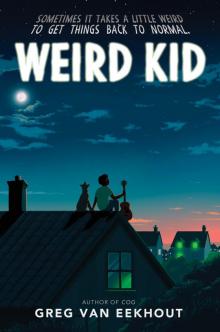 Weird Kid
Weird Kid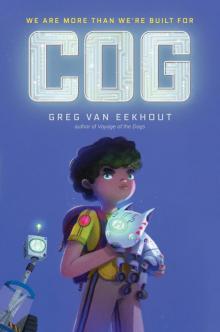 Cog
Cog The Boy at the End of the World
The Boy at the End of the World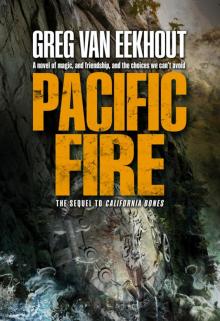 Pacific Fire
Pacific Fire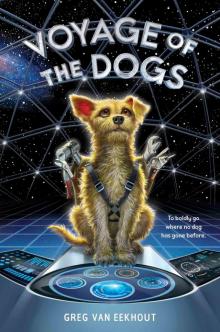 Voyage of the Dogs
Voyage of the Dogs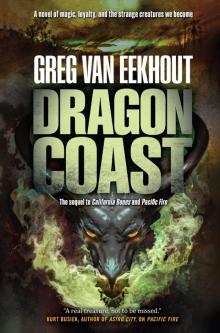 Dragon Coast
Dragon Coast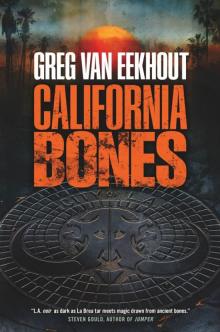 California Bones
California Bones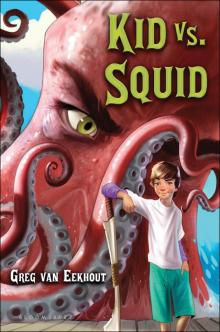 Kid vs. Squid
Kid vs. Squid